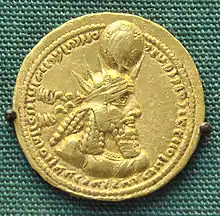273
Year 273 (CCLXXIII) was a common year starting on Wednesday (link will display the full calendar) of the Julian calendar. At the time, it was known as the Year of the Consulship of Tacitus and Placidianus (or, less frequently, year 1026 Ab urbe condita). The denomination 273 for this year has been used since the early medieval period, when the Anno Domini calendar era became the prevalent method in Europe for naming years. The year also saw most lost territories to rebellion returned to the Roman Empire by Emperor Aurelian.
| Millennium: | 1st millennium |
|---|---|
| Centuries: | |
| Decades: | |
| Years: |
| 273 by topic |
|---|
| Leaders |
| Categories |
|
| Gregorian calendar | 273 CCLXXIII |
| Ab urbe condita | 1026 |
| Assyrian calendar | 5023 |
| Balinese saka calendar | 194–195 |
| Bengali calendar | −320 |
| Berber calendar | 1223 |
| Buddhist calendar | 817 |
| Burmese calendar | −365 |
| Byzantine calendar | 5781–5782 |
| Chinese calendar | 壬辰年 (Water Dragon) 2969 or 2909 — to — 癸巳年 (Water Snake) 2970 or 2910 |
| Coptic calendar | −11 – −10 |
| Discordian calendar | 1439 |
| Ethiopian calendar | 265–266 |
| Hebrew calendar | 4033–4034 |
| Hindu calendars | |
| - Vikram Samvat | 329–330 |
| - Shaka Samvat | 194–195 |
| - Kali Yuga | 3373–3374 |
| Holocene calendar | 10273 |
| Iranian calendar | 349 BP – 348 BP |
| Islamic calendar | 360 BH – 359 BH |
| Javanese calendar | 152–153 |
| Julian calendar | 273 CCLXXIII |
| Korean calendar | 2606 |
| Minguo calendar | 1639 before ROC 民前1639年 |
| Nanakshahi calendar | −1195 |
| Seleucid era | 584/585 AG |
| Thai solar calendar | 815–816 |
| Tibetan calendar | 阳水龙年 (male Water-Dragon) 399 or 18 or −754 — to — 阴水蛇年 (female Water-Snake) 400 or 19 or −753 |

King Bahram I of Persia
Events
Roman Empire
- Emperor Aurelian sacks the city of Palmyra for a second time after putting down a new revolt.
- The kingdom of Palmyra is reunited with the Roman Empire.
- Aurelian refuses to wear the imperial crown and coat.
- Marcus Claudius Tacitus, future Roman Emperor, is consul in Rome.
- Tetricus I and Tetricus II are deposed as Gallic Emperors by Aurelian.
- Administrative reorganization of Italy: Aurelian adopts, as permanent, the reforms instituted by Caracalla.
- Aurelian increases Rome's daily bread ration to nearly 1.5 pounds and adds pig fat to the list of foods distributed free to the populace.
- Cassius Longinus, counselor of Queen Zenobia, is executed by the Romans for conspiring against Aurelian.
- An Indian delegation visits Aurelian.
Deaths
- Cassius Longinus, Greek philosopher
- Dexippus, Greek historian
- Hormizd I, king of Persia
- Wei Zhao, Chinese historian and scholar (b. 204)
- Emperor Wu of Jin, first emperor of the Jin Dynasty (b. 236)
References
This article is issued from Wikipedia. The text is licensed under Creative Commons - Attribution - Sharealike. Additional terms may apply for the media files.